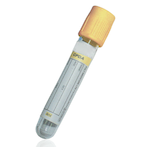Lyso GB3
Specimen Volume
A minimum of 100µL of serum is requiredSample Preparation
Turnaround Time
20 working days
Sample Processing In Laboratory
UsualSample Stability
28 days at 4°C
General Information
This assay provides a quantitative measurement of Lyso GB3 and is used as a screening tool to determine whether further enzyme analysis or genotyping is required where there is clinical suspicion of Fabry disease. It is also used to monitor the efficacy of ERT.
Patient Preparation
No specific patient preparation is required.
Notes
Plasma Lysoglobotriaosylsphingosine (Lyso GB3) levels have been shown to be elevated in patients with Fabry disease and in patients with classical and non-classical phenotypes. Lyso GB3 is a degradation product of the accumulating GB3 in lysosomes. It is useful in combination with AGalA activity and clinical signs and symptoms to determine whether a particular AGalA mutation may be classically pathogenic. Lyso GB3 levels have also been shown to fall dramatically from baseline in patients receiving ERT.
Reference Range
The lysoGB3 assay is intended as a screening assay to either initiate further investigation or to monitor a patients response to therapy. Therefore there is not a reference range associated with this assay, but a cut-off to prompt further action or to rule out Fabry’s disease.
Specifications
-
EQA Status:
ERNDIM








